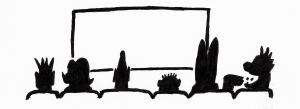
|
The world of non-commercial film and A-V |
Events Diary | Search | ||
| The Film and Video Institute | | ||||
Take One - Ideas
Under the PHASE 4 umbrella, we regularly visit clubs around the country to give shows. One of the most frequently asked questions, is “Where do you get your ideas from?”
This is the starting point for any new project and if we stumble here, then we are not going to get our film off the ground.
It seems that a shortage of ideas is the most common reason (or I could say, excuse) for not making films. Now you could be forgiven for thinking that making films would seem to be the main reason for joining a club, but apparently not. Many club members enjoy watching other peoples movies or they like handling all the equipment and gadgets available to them. Then of course there is the social side to consider. Nothing wrong with any of that of course, but without someone shooting new material, we would rapidly all become film appreciation societies.
So how to get an idea?
I always say that ideas spring from real life events.
In considering my back-catalogue of films, I recall that the majority of
them started their journey to the screen as a real-life event or incident.
A newspaper or magazine article, TV or radio news items, are obvious sources
of inspiration. Perhaps you were witness to an incident yourself or a friend
or relative may have passed on an interesting or amusing anecdote.
All we are looking for at this stage is that first glimmer of an idea, the
spark which will ignite the flame which will become an inferno. Or, in other
words, the start of our film.
By way of illustration, I will cite examples at many stages along this journey of discovery. One example of a real life event was our film, Watching.
A few years ago the media put the spotlight on stalkers. This had become a well known phenomena in the United States, particularly in regard to movie stars or celebrities who were being followed by obsessed fans. But it was also becoming more common in Britain and those being stalked were not necessarily famous people. Sometimes it was previous partners, work colleagues or even total strangers, who became obsessive about imaginary relationships with the person the were fixated on.. This, I decided would be the theme of my film.
Elements of the story came from true events and as is usually the case, this idea was interwoven with fiction to produce the final script.
Another useful source of inspiration is TV and Film. Not that I am of course suggesting plagiarism, but nevertheless there are snippets of useful story ideas to be found in many a drama production.
Many times I have watched a thriller on TV or at the cinema and like many other people have tried to “second guess” the solution to what is unfolding on the screen. Films which are well written, give us several little clues or hints as the story unfolds and we the audience may act as sleuths in trying to unravel the mystery. Perhaps we have guessed the ending before all is revealed. If we have not, then perhaps our solution to the puzzle could be used in our own script.
Watch and listen. Go shopping and take note of the brief snatches of overheard conversations as people pass you by. Observe interesting and unusual characters. All of these fragments can be used as building blocks as our plot is constructed.
I would say that almost all of my films have some truth in them, some more than others. If we are shooting fiction, that doesn't necessarily mean that it is entirely fiction. But then again, are documentaries entirely truthful? The documentary is selective in what it shows us. The film is edited and we are only shown a fraction of the material shot, usually chosen by the director.
Our film Behind the Clouds was probably split 50/50. The exact divisions between fact and fiction is not always clear cut, but then, it doesn't really matter. What does matter, is finding a good story to tell, be it drama, comedy or thriller.
In the case of a thriller, listen to the words of a famous director - Alfred Hitchcock, one of my heroes, said something along the lines of:
“Put an ordinary man (or woman) in an extraordinary situation”.
If you are familiar with the plots of films such as: North by Northwest, The 39 Steps, Rear Window and The Lady Vanishes, you will realise that all these fit this criteria. The ordinary man was usually someone like Cary Grant or James Stewart, who through mere chance, found himself drawn into an ever more threatening and dangerous situation.
Hitchcock's “plan”, was my starting point for a thriller made in 1996, Demons, which I will use to illustrate the way I put a script together.
The basic plot? Two women on a shopping trip, breakdown in their car on a lonely road on the journey home.
This will be discussed in detail in Part 2.
In the meantime, to close Part 1, I have one final word of wisdom to offer.
To sustain us through all the stages that are to come we need four things in abundance. These are: Imagination; enthusiasm, dedication and perseverance. If you, the reader, have these, then you will make that film!
Start thinking!
- By Ken Wilson (first published in FVM)
Go to next section
Return to Introduction
Share your passions.

Share your stories.